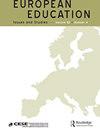从内容到能力课程——科索沃课程政策的教育解释
IF 0.9
Q4 EDUCATION & EDUCATIONAL RESEARCH
引用次数: 2
摘要
本定性研究考察了科索沃2011年最新课程改革中课程政策的变化。在课程和didaktik教育传统的理论框架下,研究结果表明,2011年引入关键能力和相关学习成果标志着与以前基于内容的课程政策的最大背离。结论是,欧洲教育趋势为2011年科索沃基于能力的课程改革提供了宏观叙事和合法性。本文章由计算机程序翻译,如有差异,请以英文原文为准。
From Content- to Competence-Based Curricula – An Educational Account of Curriculum Policy in Kosovo
Abstract This qualitative study examines the changes introduced in curriculum policy in Kosovo in the latest curriculum reform of 2011. Framed by curriculum and didaktik education traditions theoretically, the findings reveal that introduction of key competences and associated learning outcomes in 2011 marked the most substantial departure from the previously content-based curriculum policy in place. It is concluded that European education trends provided the macro narrative and legitimation for the 2011 competence-based curriculum reform in Kosovo.
求助全文
通过发布文献求助,成功后即可免费获取论文全文。
去求助
来源期刊

European Education
EDUCATION & EDUCATIONAL RESEARCH-
CiteScore
1.20
自引率
0.00%
发文量
5
期刊介绍:
uropean Education is published in association with the Comparative Education Society in Europe (CESE). It is an international peer-reviewed journal devoted to original inquiries and dialogue on education across the member states of the Council of Europe. Established in 1969, the journal features articles on education in individual member states, comparative studies on education across Europe, as well as the impact of European education initiatives globally. The journal especially encourages theoretical and empirical studies, interdisciplinary perspectives, and critical examination of the impact of political, economic, and social forces on education. European Education includes reviews of books and educational films, including those published/produced in English and other languages.
 求助内容:
求助内容: 应助结果提醒方式:
应助结果提醒方式:


